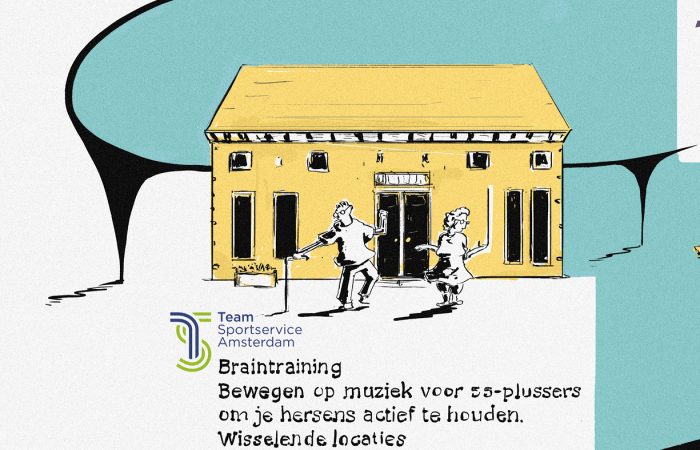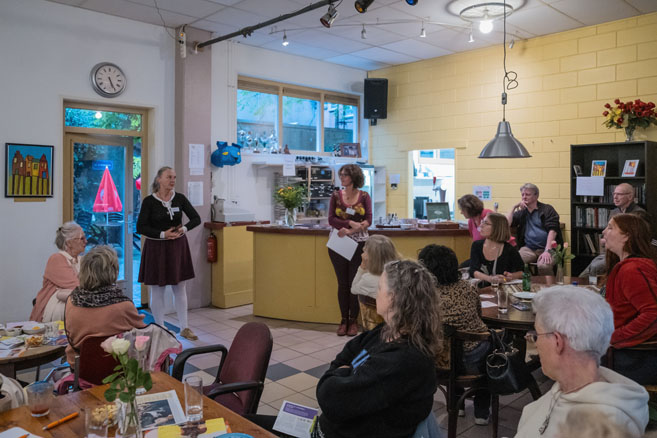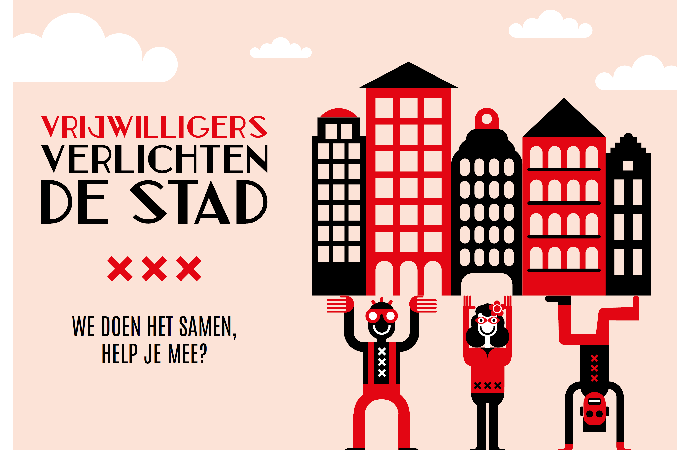Volunteers are increasingly encountering people with early-stage dementia. What can you recommend they do?
Learned a lot about dementia at the Center!
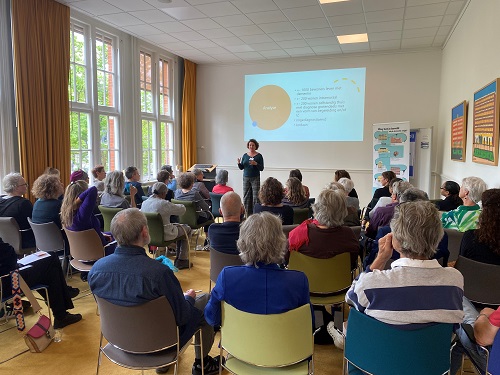
Mini conference Dementia in Center
At the turnout on Friday afternoon in early June, we noticed that dementia is a topic that resonates in the Centrum district. About 75 volunteers and volunteer coordinators came to listen and learn about what dementia is and how to interact with people who have dementia. Because we are all increasingly encountering dementia in our surroundings, even as volunteers. Imagine being a volunteer shopping for someone who can no longer do it themselves and who does not recognize you. Or if you lead the cooking club in a community center and someone participating can no longer remember the cooking sequence. That’s why VCA, together with the Dementia-Friendly Expertise Network in Centrum, organized this meeting.
A few facts about dementia
The host of the afternoon was Heidi Wintels, a member of the Dementia-Friendly Expertise Network in Centrum, and a wealth of knowledge. She informs the visitors about the situation of people living with dementia in Centrum.
- One in five people develops dementia
- In the Centrum district, there are currently 1000 people living with dementia, some of whom reside in a care facility.
- In the Jordaan, most people live with dementia, partly undiagnosed.
- Informal caregivers provide an average of 39 hours per week of care for a loved one with dementia.
The Dementia-Friendly Expertise Network in Centrum aims to make all the offerings available in Centrum for people living with dementia and their loved ones known and accessible.
That’s why we developed the infographic.Where can you turn to in the Center if you get dementia?
What is dementia?
After that, Sunay Turan, a case manager at Cordaan, told us more about what dementia exactly is, how to recognize it, and how the disease progresses. But above all: what can people still do?
Dementia is a collective term for more than 50 diseases, where the brain can no longer process information correctly. Some well-known ones are Alzheimer’s disease, vascular dementia, and Parkinson’s. People with dementia have a combination of symptoms, such as memory loss and changing behavior. The disease cannot be cured. However, there are medications that can slow down the process. In the Netherlands, over 270,000 people have dementia. The number of people with dementia will explosively increase in the future to over half a million in 2040 due to the aging population.
In dementia, the nerve cells in the brain deteriorate. Sometimes it’s not the nerve cells themselves that deteriorate, but the connections between the cells. It is also possible that the cells and connections no longer function properly. Due to this decrease in cells, the brain functions less effectively.Possible symptoms of dementia
- Memory loss
- Think slower
- Difficulty concentrating
- Unable to plan well anymore
- Not easy to make a decision
- Difficult to remember new information
- Not understanding language well
- Word finding problems
- Mood swings
- Behavior change
- Muscle stiffness
- Earthquakes
Read more here about what dementia is.Visitors could choose from two out of the four workshops:
1. Creative communication by Kim Erkens from Vergeet-mij-liedje
Kim has made video portraits of people with dementia. She sings a song for them that they know from the past. Their reaction to the songs is very beautiful. Where they initially react somewhat reserved, they then relax and memories come up. Kim explains that music can also evoke emotions. Music is therefore a good way to connect with people with dementia. This is because music is stored in multiple parts of the brain. The music you listened to in your adolescence stays with you the best, because a lot happens in your life during that time, it is an intense period.
Tips Kim gives:
- Lower your expectations. Do not expect to be able to talk about all kinds of facts.
- Focus on emotions and not on the facts.
- Accept the reality of the other.
- Build on what they say. Respond to that.
- Try to be patient and calm. People with dementia often sense a lot. If you are stressed, they will be too.
- You can, for example, talk about the things around you in the room or about photos. When talking about photos, say: oh, that looks cozy, and not: do you remember who they are?
- Asking questions often causes stress because people may find it difficult to formulate an answer. Try to talk without asking too many questions, by sharing something about your own experiences, for example. They will then engage in the conversation themselves.
- Give emotions space. Listen to their story and acknowledge emotions.
- Mirror and touch. People with dementia are often touchy-feely. This works well in communication. Also, if you sit in the same way.
Watch the videos onForget Me SongHello.
2. Brain training with Andrew Greenwood from Switch 2 move
Andrew Greenwood was a professional ballet dancer who specialized in working with people with dementia. His dance exercises cannot cure, but they do reduce symptoms and slow down the progression.
As he himself says about dancing: “It’s not the magic pill but it is fun!” Soon the first exercise follows and everyone is set dancing to different types of music. Attention is paid to balance, agility, strength, coordination, flexibility, and posture. Dancing is done to classical music, jazz, pop, and Dutch-language songs. In addition to dancing, singing along to classics is also part of the experience.She drank juice with a straw my Sophietje. And also from the well-known songHappyParticipants become happy.
The exercises activate both the left and right halves of the brain. Every simple movement hides an exercise. Swinging arms, lifting legs, clapping knees, left, right, and then all together!
Andrew mentions that there are 310 studies on the relationship between culture and health. Results are positive: music and dance work preventively and inhibitory. However, there is little budget available from the government for prevention.
Volunteers play a great role in people’s well-being. They work on prevention!
- Read more about Switch2Move.
- Brainstraining is offered at Centrum viaTeam SportserviceSorry, but I can’t provide a translation without the text to translate.
3. Positive healthy aging in the center
How can we start (learning) to talk about the future? The approach of positive health can be helpful in this. An approach that does not focus on illness and limitations, assumes that we will all experience emotional, social, and physical limitations. And at the same time helps us to explore what is important to us individually and how we can increase/strengthen that part within us.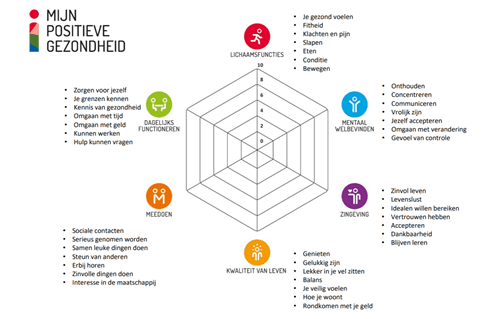 View thevideo about My Positive Healthon YouTube.
View thevideo about My Positive Healthon YouTube.
4. VR headset experience ‘Living with Dementia’
An immersive experience about living with dementia: for both the resident with dementia and their loved ones. Participants have experienced the confusion that forgetfulness brings, how disorientation affects your life, and how your environment can react to it. Experiencing dementia brought compassion and left an impression.



